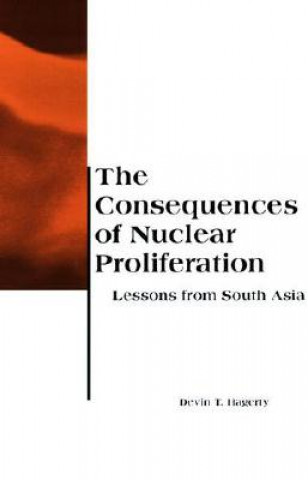
Code: 04562330
Consequences of Nuclear Proliferation
by Devin T. Hagerty
Analysts of international politics have debated heatedly over the likely consequences of the spread of nuclear weapons. Most argue that nuclear proliferation will destabilize the world and increase the risk of nuclear war. Others ... more
- Language:
 English
English - Binding: Paperback
- Number of pages: 224
Publisher: MIT Press Ltd, 1998
- More about this

9.55 €
RRP: 11.53 €
You save 1.98 €
Availability:
50/50 We think title might be available. Upon your order we will do our best to get it within 6 weeks.
We think title might be available. Upon your order we will do our best to get it within 6 weeks.We search the world
You might also like
-

Twentieth-Century Fantasists
185.76 € -

Capital and Labour in the British Columbia Forest Industry, 1934-74
112.90 € -9 % -

Love Letters from a Desert Rat
21.63 € -9 % -

Covergirl: Wespen-Akte
39.64 € -2 % -

Foundations of Freedom
34.71 € -

ACHIEVING PROJECT MANAGEMENT SUCCESS IN
52.92 € -4 % -

Der Akute Gelenkrheumatismus
66.61 €
Give this book as a present today
- Order book and choose Gift Order.
- We will send you book gift voucher at once. You can give it out to anyone.
- Book will be send to donee, nothing more to care about.
Availability alert
Enter your e-mail address and once book will be available,
we will send you a message. It's that simple.
More about Consequences of Nuclear Proliferation
You get 24 loyalty points
 Book synopsis
Book synopsis
Analysts of international politics have debated heatedly over the likely consequences of the spread of nuclear weapons. Most argue that nuclear proliferation will destabilize the world and increase the risk of nuclear war. Others counter that the threat of nuclear war is enough to convince new nuclear nations to adopt prudent security policies.In this book, Devin Hagerty examines the relationship between two emerging nuclear powers--India and Pakistan--to assess how nuclear weapons have changed their foreign and military policies. Even before India and Pakistan tested nuclear weapons in 1998, both countries believed that the other was capable of assembling a bomb. In recent years, their respective governments had conducted diplomacy in the shadow of those nuclear suspicions. India and Pakistan have fought three wars since becoming independent in 1947 and their relations remain tense, especially over the disputed border region of Kashmir.Hagerty presents detailed studies of the January 1987 Indo-Pakistani crisis, precipitated by India's "Brasstacks" military exercises, and the 1990 confrontation over Kashmir. He finds that the two countries nearly went to war in the "Brasstacks" crisis, at least partly because Pakistan's nuclear capability remained nascent. In the 1990 crisis, however, both countries were aware of the possibility of nuclear escalation and acted more cautiously. Hagerty finds little evidence of preparations for preemptive nuclear strikes in the 1990 crisis. Instead, India and Pakistan appear to have embraced the logic of nuclear deterrence. Hagerty concludes that relations between India and Pakistan in recent years support the argument that nuclear proliferation does not necessarily destabilize international relations and may even reduce the risk of war. This conclusion is grounds for optimism about peace in South Asia now that India and Pakistan are overt nuclear-weapons states.
 Book details
Book details
Book category Books in English Humanities History History: earliest times to present day
9.55 €
- Full title: Consequences of Nuclear Proliferation
- Subtitle: Lessons from South Asia
- Author: Devin T. Hagerty
- Language:
 English
English - Binding: Paperback
- Number of pages: 224
- EAN: 9780262581615
- ISBN: 0262581612
- ID: 04562330
- Publisher: MIT Press Ltd
- Weight: 340 g
- Dimensions: 229 × 152 × 13 mm
- Date of publishing: 30. July 1998
Trending among others
-

History of the Decline and Fall of the Roman Empire
13.37 € -27 % -

Illustrated Encyclopedia of Uniforms of World War I
20.62 € -26 % -

Hidden Figures
15.39 € -23 % -

Tuesdays With Morrie
11.06 € -3 % -

Invisible Hook
16.39 € -17 % -

Distant Mirror
13.27 € -28 % -

Masters of Command
15.79 € -21 % -

Caesar
18.71 € -21 % -

Neighborhoods of Augustan Rome
52.12 € -

Six Wives of Henry VIII
18.41 € -19 % -

Orpheus
19.61 € -18 % -

Operation Market-Garden 1944 (3)
17.20 € -28 % -

Generation. Nature of the Child. Diseases 4. Nature of Women and Barrenness
35.01 € -

Flags of the Napoleonic Wars (1)
15.09 € -18 % -

Bloodied Banners: Martial Display on the Medieval Battlefield
34.91 € -6 % -

Coan Prenotions. Anatomical and Minor Clinical Writings
35.01 € -

Guns, Germs, and Steel
16.80 € -

The Origins of Totalitarianism
10.36 € -22 % -

Tuesdays With Morrie
10.25 € -28 % -

From Third World to First
13.98 € -20 % -

Meditations
8.64 € -22 % -

Peloponnesian War
12.27 € -28 % -

Underground
10.86 € -23 % -

Access to History for the IB Diploma: Causes and effects of 20th-century wars Second Edition
41.35 € -

Pearson Baccalaureate: History Causes and Effects of 20th-century Wars 2e bundle
59.16 € -

Cold War
13.27 € -28 % -

Transformation of the World
33.40 € -

Myth of the Andalusian Paradise
23.64 € -23 % -

Virgin Mother Goddesses of Antiquity
34.11 € -

On Tyranny
9.75 € -26 % -

King Leopold's Ghost
13.17 € -15 % -

Tuesdays With Morrie
11.06 € -16 % -

Homo Ludens
11.97 € -

Chickenhawk
12.17 € -22 % -

Fear and Loathing on the Campaign Trail '72
13.27 € -28 % -

The Art of Combat
28.67 € -18 % -

Chernobyl Prayer
10.56 € -20 % -

History of the Ancient World
33.20 € -6 % -

Russian Journal
13.27 € -28 % -

Age Of Extremes
17.20 € -21 % -

Age Of Empire
16.59 € -21 % -

Making Medieval Manuscripts
17 € -19 % -

Postwar
16.49 € -25 % -

Gallic War
9.35 € -27 % -

Lives of the Caesars
10.25 € -28 % -

Anunnaki Homeworld
16.59 € -20 % -

Witches and Pagans
25.05 € -2 % -

King's Two Bodies
27.16 € -11 % -

Shake Hands With The Devil
12.87 € -22 %
Collection points Bratislava a 2642 dalších
Copyright ©2008-24 najlacnejsie-knihy.sk All rights reservedPrivacyCookies


 15549 collection points
15549 collection points Delivery 2.99 €
Delivery 2.99 € 02/210 210 99 (8-15.30h)
02/210 210 99 (8-15.30h)